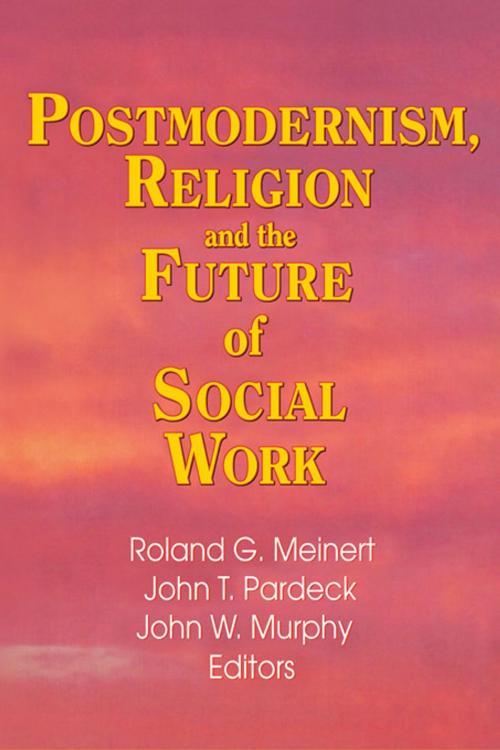Postmodernism, Religion, and the Future of Social Work
Nonfiction, Religion & Spirituality, Other Practices, Fundamentalism, Social & Cultural Studies, Social Science, Archaeology| Author: | Jean A Pardeck, John W Murphy, Roland Meinert | ISBN: | 9781136381034 |
| Publisher: | Taylor and Francis | Publication: | October 12, 2012 |
| Imprint: | Routledge | Language: | English |
| Author: | Jean A Pardeck, John W Murphy, Roland Meinert |
| ISBN: | 9781136381034 |
| Publisher: | Taylor and Francis |
| Publication: | October 12, 2012 |
| Imprint: | Routledge |
| Language: | English |
Postmodernism, Religion, and the Future of Social Work discusses the benefits and disadvantages of the postmodern philosophy as a foundation for social work and human service practice. Social work students and practitioners will learn about the developments that have shaped postmodern thinking as they pertain to society in general, as well as to the profession of social work. By exploring this increasingly popular philosophy, Postmodernism, Religion, and the Future of Social Work provides you with methods and theories that help you evalute contemporary problems more effectively, resulting in better services for your clients.
Challenging traditional social work practices, Postmodernism, Religion, and the Future of Social Work examines postmodernism in terms of a world view that is emerging along indeterminate and ambiguous lines. With the goal of helping you provide more helpful and relevant services to your clients, Postmodernism, Religion, and the Future of Social Work discusses many themes related to postmodernism, including:
-
understanding how principles of postmodernism are characterized by ongoing change, indeterminacy, and relativism
-
reviewing the historical movement of a postmodern perspective and its present implications on social work practice
-
supporting the strengths perspective through a postmodernist approach
-
discussing some unintended and potentially negative consequences of postmodernism that arise from uncritically adopting postmodernistic principles
-
analyzing the nature of social work and social welfare in Britain and the Western World to gain insight into how social theory is associated with postmodernity, postmodernization, and post-Fordism
-
exploring the postmodernistic relationship between institutionalized religions and social services provided by religious auspices
Although postmodernism offers a new and different way of understanding social problems and of structuring social work practice, this text urges you to be critical in the evaluation of its aspects and outlines some possibly negative outcomes in certain situations. In evaluating postmodernism and its relevance to social services and social problems, Postmodernism, Religion, and the Future of Social Work offers theories and research into methods that go beyond traditional practices to assist you in providing effective and relevant services for your clients.
Postmodernism, Religion, and the Future of Social Work discusses the benefits and disadvantages of the postmodern philosophy as a foundation for social work and human service practice. Social work students and practitioners will learn about the developments that have shaped postmodern thinking as they pertain to society in general, as well as to the profession of social work. By exploring this increasingly popular philosophy, Postmodernism, Religion, and the Future of Social Work provides you with methods and theories that help you evalute contemporary problems more effectively, resulting in better services for your clients.
Challenging traditional social work practices, Postmodernism, Religion, and the Future of Social Work examines postmodernism in terms of a world view that is emerging along indeterminate and ambiguous lines. With the goal of helping you provide more helpful and relevant services to your clients, Postmodernism, Religion, and the Future of Social Work discusses many themes related to postmodernism, including:
-
understanding how principles of postmodernism are characterized by ongoing change, indeterminacy, and relativism
-
reviewing the historical movement of a postmodern perspective and its present implications on social work practice
-
supporting the strengths perspective through a postmodernist approach
-
discussing some unintended and potentially negative consequences of postmodernism that arise from uncritically adopting postmodernistic principles
-
analyzing the nature of social work and social welfare in Britain and the Western World to gain insight into how social theory is associated with postmodernity, postmodernization, and post-Fordism
-
exploring the postmodernistic relationship between institutionalized religions and social services provided by religious auspices
Although postmodernism offers a new and different way of understanding social problems and of structuring social work practice, this text urges you to be critical in the evaluation of its aspects and outlines some possibly negative outcomes in certain situations. In evaluating postmodernism and its relevance to social services and social problems, Postmodernism, Religion, and the Future of Social Work offers theories and research into methods that go beyond traditional practices to assist you in providing effective and relevant services for your clients.















